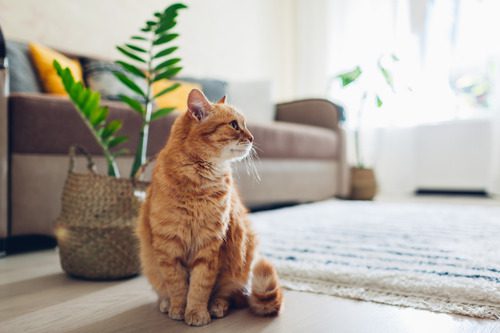Cat Not Eating? How Endoscopy Can Uncover the Cause and Help Your Feline’s Health
When a cat stops eating, it’s often more than a picky phase—it can signal an underlying health problem that requires medical attention. Many pet owners don’t realize how quickly a cat’s health can decline without proper nutrition. If your cat isn’t eating, it’s important to identify the cause as soon as possible. One highly effective diagnostic tool your veterinarian may recommend is endoscopy. This non-surgical method allows your vet to see inside your cat’s gastrointestinal tract and collect samples, helping uncover what’s wrong and guide treatment.
At Animal Hospital of Lake Villa, we understand how concerning it is to see your cat turn away from their food. If your cat is not eating, call us at (847) 356-8387 to schedule an appointment and learn if endoscopy may be the next step in their care.

What Does It Mean When a Cat Is Not Eating?
Loss of appetite in cats—known medically as anorexia—can stem from a wide range of causes. Some are temporary and mild, while others require immediate intervention. It’s not uncommon for pet owners to notice their cat skipping a meal here or there, but when the behavior continues beyond 24 hours, it’s time to speak with your veterinarian.
Common Causes for a Cat Not Eating
A cat not eating may be experiencing pain, nausea, or discomfort caused by gastrointestinal issues, dental problems, infections, or chronic illnesses. Emotional stress, environmental changes, or new foods can also play a role. Because cats are experts at hiding symptoms, appetite loss might be one of the first visible signs that something is wrong.
Why Endoscopy May Be Recommended
Endoscopy provides a safe and effective way to examine internal organs without invasive surgery. If your cat is not eating and your veterinarian suspects an internal issue, this diagnostic approach can offer clear answers and help guide the next steps in care.
How Endoscopy Helps Identify Why Your Cat Is Not Eating
Veterinary endoscopy is a minimally invasive procedure that gives your veterinarian a detailed view of your cat’s digestive tract. This technique uses a flexible tube equipped with a camera and light to examine the esophagus, stomach, and portions of the small intestine.
What Happens During a Cat Endoscopy?
Before the procedure, your cat will be placed under general anesthesia for comfort and safety. Once sedated, the endoscope is gently guided through the mouth and into the upper gastrointestinal tract. The camera transmits real-time images to a monitor, allowing your veterinarian to inspect the lining of the organs and look for inflammation, ulcers, masses, or foreign bodies.
If anything abnormal is found, your veterinarian can collect small tissue samples (biopsies) during the same procedure. These samples are then sent to a lab for further testing to help diagnose issues like inflammatory bowel disease (IBD), infections, or cancer.
When Is Endoscopy Recommended?
Endoscopy may be recommended if your cat is not eating and is also experiencing:
- Chronic vomiting
- Weight loss
- Diarrhea
- Difficulty swallowing
- Abdominal pain
This tool is especially useful when bloodwork, X-rays, or ultrasound exams haven’t provided definitive answers. If your cat’s lack of appetite continues and the cause remains unclear, endoscopy may reveal what’s happening inside the digestive system.
Common Conditions Endoscopy Can Detect in Cats
Endoscopy plays an important role in diagnosing several medical conditions that may be contributing to your cat’s loss of appetite.
Inflammatory Bowel Disease (IBD)
IBD is one of the most common reasons a cat may stop eating. It occurs when the intestinal walls become chronically inflamed, making it difficult to digest and absorb nutrients. Endoscopy allows your veterinarian to see signs of inflammation and take biopsies to confirm the diagnosis.
Gastritis or Ulcers
When the stomach lining becomes irritated, inflamed, or ulcerated, it can lead to nausea and discomfort. Cats with gastritis often show signs like vomiting, drooling, or refusing food. Endoscopy can identify areas of damage and help determine the severity of the condition.
Foreign Body Ingestion
Cats are curious by nature, and occasionally they swallow items that can block or irritate their digestive tract. Hair ties, string, small toys, and plant material are some common culprits. If your cat is not eating due to a suspected blockage, endoscopy may locate and sometimes even remove the object without surgery.
Gastrointestinal Tumors
Endoscopy can help detect tumors or abnormal growths that might be interfering with your cat’s ability to eat. Biopsies taken during the procedure provide essential information about the type of growth and guide treatment options.
Benefits of Using Endoscopy When Your Cat Stops Eating
Endoscopy offers several advantages when it comes to diagnosing gastrointestinal issues in cats:
- Minimally Invasive: There’s no need for incisions or stitches. Your cat can usually return home the same day.
- Accurate Diagnosis: Seeing the gastrointestinal tract in real-time provides valuable insight that other tests may miss.
- Biopsy Collection: Endoscopy allows veterinarians to collect targeted tissue samples safely and precisely.
- Faster Recovery: Compared to exploratory surgery, endoscopy has a much shorter recovery time and lower risk of complications.
Because it provides such a detailed view of your cat’s internal health, endoscopy can help your veterinarian make informed decisions about treatment and care—especially if your cat is not eating and other tests haven’t revealed the cause.
What to Expect After an Endoscopy
After the procedure, your cat may be groggy from anesthesia for a few hours. Most cats recover quickly and resume normal behavior within a day. Your veterinary team will provide instructions on how to monitor your cat at home and when to follow up. If biopsies were taken, results typically return within a few days. Once a diagnosis is confirmed, your veterinarian will discuss treatment options with you. Whether it’s medication, dietary changes, or additional procedures, having a clear diagnosis is the first step toward helping your cat feel better and regain their appetite. If your cat is not eating and endoscopy is recommended, it’s because your veterinarian believes it offers the best chance of identifying the issue with the least stress to your pet.
Why Prompt Action Matters When Your Cat Is Not Eating
A cat not eating isn’t something to wait out. Cats rely on steady calorie intake to stay healthy. Prolonged anorexia can lead to hepatic lipidosis (fatty liver disease), a serious condition that requires intensive treatment. The sooner you know why your cat has stopped eating, the sooner you can begin targeted care. Endoscopy offers a way to reach a diagnosis quickly and accurately. If your cat in Lake Villa, IL is showing signs of appetite loss, don’t ignore the symptoms. The veterinary team at Animal Hospital of Lake Villa is equipped to help. Call us today at (847) 356-8387 to schedule a consultation.
About Us
Animal Hospital of Lake Villa has provided compassionate, personalized pet care since 1993. Our Fear Free-certified, AAHA-accredited team helps every pet, even the nervous ones, feel safe and at ease.
